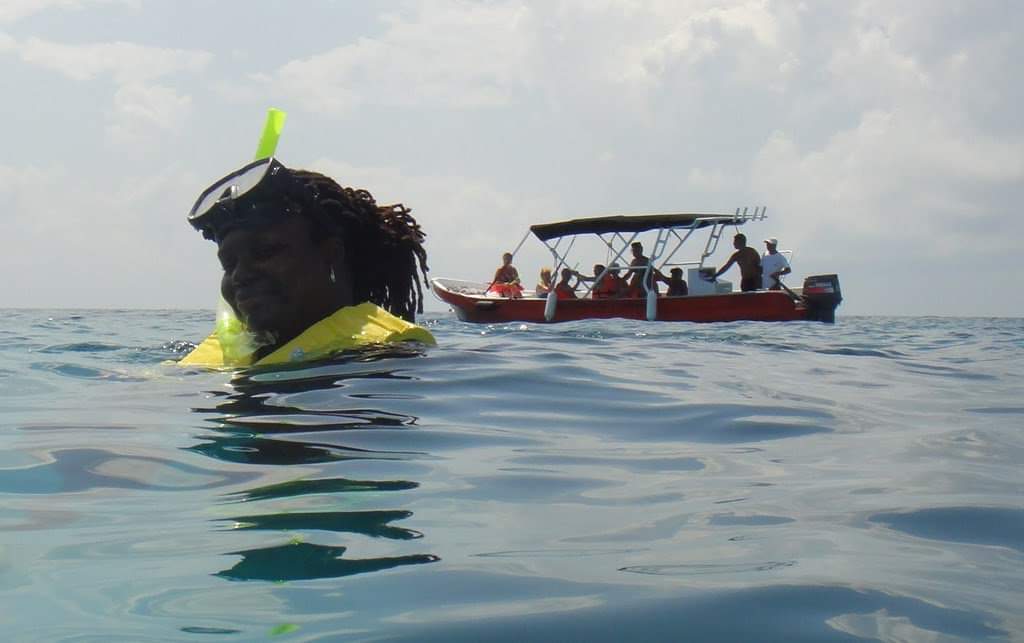The author's snorkeling experiences drove her to ask: Can I dive despite my asthma?
The Dos and Don'ts of Scuba Diving with Asthma
Courtesy Image
Scuba Diving magazine does not provide medical advice. Everyone should speak with a doctor about their particular situation. The Divers Alert Network is also a good, additional resource for medical concerns.
Scuba is never without risk, but diving with asthma comes with additional complications. The breathing restrictions inherent in diving can be a stressor, and there is an increased chance of air bubbles getting caught in an asthmatic’s tightened airways, which, if not expelled, could lead to an air embolism or ruptured lung.
This has been a frequent disappointment to me, an adult asthmatic that adores snorkeling. I’ve snorkeled without issue from Aruba’s Caribbean Sea to Australia’s Great Barrier Reef, and, at 50 years old, I haven’t had an attack requiring hospitalization in 40 years. In that time, new medications have developed that greatly reduced the chance of repeat attacks. Yet, each time I’ve asked a scuba operator for permission to dive, the answer has been a flat “no.”
No longer willing to accept a blanket ban on diving with asthma with no explanation, I turned to the experts to learn if and how to manage these risks in hopes of opening the doors of the deep for me and other asthmatics.
An Expert Risk Assessment
I met with Dr. Richard Moon, Medical Director at Duke University’s Center for Hyperbaric Medicine & Environmental Physiology, and corresponded with Dr. James Chimiak, Chief Medical Officer at Divers Alert Network (DAN) to discuss diving with asthma.
Both doctors agree that the primary concern with asthmatics diving is the increased risk of developing what’s known as bronchospasms from breathing compressed gas underwater. This is the tightening of the muscles that line the large airways (bronchi) in the lungs, which can lead to airway obstruction. If an asthmatic diver tries to ascend while this occurs, the air pressure in the lungs may expand before one can breathe out, which can lead to a fatal pulmonary barotrauma and/or an air embolism.
Diving can also make it harder to catch your breath. “While it is often easy to stop, rest and catch one’s breath while exercising on land, this may not be possible underwater,” says DAN’s information page about diving with asthma.
How likely any of this is to happen, however, depends on the severity of your own asthma. As DAN continues: “If the treatment regimen can return the pulmonary function test results to normal, especially following exercise, people with asthma may be able to safely dive (and perform the strenuous exercise that may be required during diving).”
Asthma does not inherently keep you from the deep.
J.S. Lamy
The bottom line here is that diving with asthma is possible for some people, but only if you are cleared by a dive doctor based on your specific asthma severity and risks. You can look for a diving doctor that can perform an assessment through DAN’s Physician Referral Network, which can be reached at +1 (919) 684-2948 during business hours Monday through Friday.
Depending on where you are looking to get certified, you should also research any country-specific requirements. In the U.K., for example, you are fine to dive if your asthma is not cold, exercise or emotion-induced and you have not needed a bronchodilator in the last 48 hours. Australia, however, is stricter—all prospective divers have to pass a spirometry test before certification.
The Do’s of Asthmatic Diving
Based on my conversations with Drs. Moon and Chimiak, here are seven things you should do if you are looking to dive with asthma.
Do get a fitness to dive (FTD) evaluation from a dive doctor. An exercise test (often on a treadmill or exercise bike) may be recommended. Well-controlled asthma may be fine for diving but your fitness to dive must be individually assessed.
Do have some swimming ability and a certain level of strength and cardiovascular fitness.
Do get a spirometry test that measures how well your lungs function. This involves breathing into a machine that measures the amount and rate you can inhale and exhale.
Do consider taking twice daily peak flow measurements during your diving season. Your physician may recommend not diving until within 10% of best values for at least 48 hours before diving.
Do have your inhaler on the boat or on shore to relieve an acute episode of bronchospasm.
Do abandon your dive if you become wheezy or short of breath.
Do mitigate risk and prevent a lung overinflation injury by not ascending faster than the required ascent rate, particularly in the last 25 feet
The Don'ts of Asthmatic Diving
These are three things the doctors say you should not do if you are an asthmatic that wants to dive.
Don’t hide your asthmatic history from a physician. Even if you have been symptom-free for several years, you will be asked questions to gain medical clearance. Be truthful. The more they know, the better equipped they are to truly test you for safety.
Don’t dive if you have cold, exercise or emotion-induced asthma attacks. Breathing cold air commonly occurs while diving. This cooling can be due to the expansion of compressed gas from the scuba cylinder and the additional ambient cooling if the water is cold.
Don’t dive if you need a daily rescue inhaler, have used one in the 48 hours preceding a trip or have had any other chest symptoms. Daily maintenance of inhaled corticosteroids may be permissible if providing reliable control.
Dispatch From an Asthmatic Diver
Nathan Ryder is an Orange County, California dive instructor that was diagnosed with asthma at age 13 after having trouble with shortness of breath while playing school sports. He is now 32 years old and has been diving for 17 years.
When Nathan spoke to his general practitioner about diving with asthma, the physician referred him to another doctor, a frequent diver.
“While many doctors are not familiar with diving clearance, you can always find reputable ones through DAN where there’s a list of doctors who can examine you for possible medical clearance,” Ryder says.
He has also developed his own guidelines to prepare for a dive. “The most important thing is being well hydrated. It’s important because you have super dry air shooting straight back into your throat for an elongated period of time. With asthma this can be a trigger, so it’s important to keep mucus membranes moist. Drink water before, during an interval, and after your dive.”
While Ryder doesn’t use an inhaler before diving, he brings one on board for peace of mind. His advice for asthmatic diving candidates? “Know yourself and your limits. If you’re in the clear, then don’t let fear hold you back. It’s a world of wonder down there.”
Don’t Give Up
For me, finding a safe way to dive is still a work in progress—Dr. Moon felt my spirometry test indicated I was not ready to go on to the next phase of testing. We discussed my blood-pressure medicine and determined the one I am taking is known for increasing asthmatic symptoms.
“On a regular basis we test people with asthma who wish to scuba dive,” Dr. Moon said. “Not every asthmatic can dive, but with the appropriate precautions most can.”
With that encouragement, I’ll discuss switching medications with my cardiologist and pulmonologist. If these adjustments control my asthma even more, I know diving is in my future.
Related

When you subscribe to the blog, we will send you an e-mail when there are new updates on the site so you wouldn't miss them.
